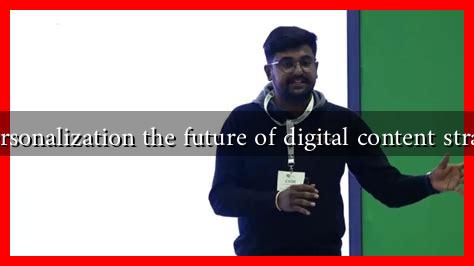-
Table of Contents
Is Personalization the Future of Digital Content Strategy?
In an era where consumers are bombarded with information, the need for personalized content has never been more critical. As digital landscapes evolve, businesses are increasingly recognizing that a one-size-fits-all approach to content is no longer effective. This article explores the significance of personalization in digital content strategy, its benefits, challenges, and future trends.
The Rise of Personalization in Digital Marketing
Personalization in digital marketing refers to the practice of tailoring content to meet the specific needs and preferences of individual users. This approach has gained traction due to several factors:
- Consumer Expectations: Today’s consumers expect brands to understand their preferences and deliver relevant content.
- Technological Advancements: Tools like AI and machine learning enable businesses to analyze user data and create personalized experiences.
- Increased Competition: As more brands enter the digital space, personalization helps companies stand out and foster customer loyalty.
Benefits of Personalization
Implementing a personalized content strategy can yield significant benefits for businesses:
- Enhanced User Experience: Personalized content improves user engagement by providing relevant information that resonates with the audience.
- Higher Conversion Rates: According to a study by Epsilon, 80% of consumers are more likely to make a purchase when brands offer personalized experiences.
- Improved Customer Retention: Personalized communication fosters a sense of connection, leading to increased customer loyalty and repeat business.
Case Studies: Successful Personalization in Action
Several companies have successfully implemented personalization strategies, showcasing its effectiveness:
- Netflix: By analyzing viewing habits, Netflix provides tailored recommendations, which account for over 80% of the content watched on the platform.
- Amazon: Amazon’s recommendation engine suggests products based on user behavior, contributing to 35% of the company’s revenue.
- Spotify: Spotify’s personalized playlists, such as “Discover Weekly,” have significantly increased user engagement and satisfaction.
Challenges of Personalization
Despite its advantages, personalization comes with challenges that businesses must navigate:
- Data Privacy Concerns: With increasing scrutiny on data privacy, companies must balance personalization with ethical data usage.
- Implementation Costs: Developing a robust personalization strategy can require significant investment in technology and talent.
- Content Overload: Too much personalization can lead to overwhelming users with options, potentially causing decision fatigue.
The Future of Personalization in Digital Content Strategy
As technology continues to advance, the future of personalization in digital content strategy looks promising:
- AI and Machine Learning: These technologies will enable even more sophisticated personalization, allowing brands to predict user behavior and preferences.
- Omnichannel Experiences: Personalization will extend across multiple channels, ensuring a seamless experience whether users are on mobile, desktop, or in-store.
- Hyper-Personalization: Brands will move towards hyper-personalization, where content is tailored not just to demographics but also to individual user journeys.
Conclusion
In conclusion, personalization is not just a trend; it is becoming a fundamental aspect of digital content strategy. As consumers demand more relevant and engaging experiences, businesses that embrace personalization will likely see enhanced user satisfaction, increased conversion rates, and improved customer loyalty. However, companies must also address the challenges associated with data privacy and implementation costs. By leveraging technology and focusing on the individual needs of their audience, brands can position themselves for success in an increasingly competitive digital landscape.
For more insights on personalization and digital marketing strategies, visit Forbes.


